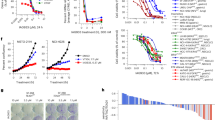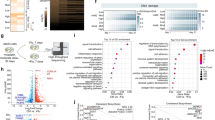Abstract
Platinum-based chemotherapy is currently a standard treatment strategy for patients with gastric cancer. Eventhough it has been widely shown that microRNAs (miRNAs) are involved in tumor development, whether miRNAs have a role in chemosensitivity of gastric cancer cells to platinum-based treatment remain largely undefined. In this study, a cisplatin-resistant gastric cancer cell line (SGC7901/DDP) with stable enhanced expression or knockdown of let-7b was generated. MTT and TUNEL assays were carried out to assess whether miR-let-7 is crucial for cell viability and apoptosis, respectively. In vitro luciferase reporter assay was performed to explore target genes of let-7b. Further, a subcutaneously transplanted tumor model in BALB/c nude mice was used to determine the impacts of let-7b on tumor growth in vivo. We observed that the let-7b-expression level of SGC7901/DDP cells was significantly lower than for its parental SGC7901 cells. Transfection of let-7b mimics was found to increase the cytotoxicity of DDP to SGC7901/DDP cells by inducing apoptosis. However, reversed cytotoxicity of DDP was observed in SGC7901/DDP cells with knockdown of let-7b. Luciferase reporter assay indicated that let-7b targeted AURKB in SGC7901/DDP cells. Knockdown of AURKB imitated the effect of let-7b overexpression on the sensitivity of SGC7901/DDP cells to DDP. Further investigation demonstrated that the SGC7901/DDP primary tumor growth was significantly reduced by let-7b mimic transfection. These findings indicate that overexpression of let-7b might provide a potential strategic approach for attenuating DDP resistance in SGC7901/DDP human gastric cancer cells.
This is a preview of subscription content, access via your institution
Access options
Subscribe to this journal
Receive 12 print issues and online access
$259.00 per year
only $21.58 per issue
Buy this article
- Purchase on Springer Link
- Instant access to full article PDF
Prices may be subject to local taxes which are calculated during checkout





Similar content being viewed by others
Change history
21 November 2018
The original version of this Article neglected to indicate that the study was supported by Anhui Natural Science Foundation Project (1608085MH201). This has now been corrected in both the PDF and HTML versions of the Article.
References
Siegel RL, Miller KD, Jemal A. Cancer statistics, 2016. CA Cancer J Clin. 2016;66:7–30.
Crew KD, Neugut AI. Epidemiology of gastric cancer. World J Gastroenterol. 2006;12:354–62.
Bao L, Jaramillo MC, Zhang Z, Zheng Y, Yao M, Zhang DD, et al. Induction of autophagy contributes to cisplatin resistance in human ovarian cancer cells. Mol Med Rep. 2015;11:91–8.
Cheng CJ, Bahal R, Babar IA, Pincus Z, Barrera F, Liu C, et al. Microrna silencing for cancer therapy targeted to the tumour microenvironment. Nature. 2015;518:107–10.
Djuranovic S, Nahvi A, Green R. Mirna-mediated gene silencing by translational repression followed by mrna deadenylation and decay. Science. 2012;336:237–40.
Shenoy A, Blelloch RH. Regulation of microrna function in somatic stem cell proliferation and differentiation. Nat Rev Mol Cell Biol. 2014;15:565–76.
Calin GA, Croce CM. Microrna signatures in human cancers. Nat Rev Cancer. 2006;6:857–66.
Pogribny IP, Filkowski JN, Tryndyak VP, Golubov A, Shpyleva SI, Kovalchuk O. Alterations of micrornas and their targets are associated with acquired resistance of mcf-7 breast cancer cells to cisplatin. Int J Cancer. 2010;127:1785–94.
Kovalchuk O, Filkowski J, Meservy J, Ilnytskyy Y, Tryndyak VP, Chekhun VF, et al. Involvement of microrna-451 in resistance of the mcf-7 breast cancer cells to chemotherapeutic drug doxorubicin. Mol Cancer Ther. 2008;7:2152–9.
Bockhorn J, Dalton R, Nwachukwu C, Huang S, Prat A, Yee K, et al. Microrna-30c inhibits human breast tumour chemotherapy resistance by regulating twf1 and il-11. Nat Commun. 2013;4:1393.
Yang M, Shan X, Zhou X, Qiu T, Zhu W, Ding Y, et al. Mir-1271 regulates cisplatin resistance of human gastric cancer cell lines by targeting igf1r, irs1, mtor, and bcl2. Anticancer Agents Med Chem. 2014;14:884–91.
Zhou X, Jin W, Jia H, Yan J, Zhang G. Mir-223 promotes the cisplatin resistance of human gastric cancer cells via regulating cell cycle by targeting fbxw7. J Exp Clin Cancer Res. 2015;34:28.
Xia JT, Chen LZ, Jian WH, Wang KB, Yang YZ, He WL, et al. Microrna-362 induces cell proliferation and apoptosis resistance in gastric cancer by activation of nf-kappab signaling. J Transl Med. 2014;12:33.
Barh D, Malhotra R, Ravi B, Sindhurani P. Microrna let-7: an emerging next-generation cancer therapeutic. Curr Oncol. 2010;17:70–80.
Kong D, Heath E, Chen W, Cher ML, Powell I, Heilbrun L, et al. Loss of let-7 up-regulates ezh2 in prostate cancer consistent with the acquisition of cancer stem cell signatures that are attenuated by br-dim. PLoS ONE. 2012;7:e33729.
Sugimura K, Miyata H, Tanaka K, Hamano R, Takahashi T, Kurokawa Y, et al. Let-7 expression is a significant determinant of response to chemotherapy through the regulation of il-6/stat3 pathway in esophageal squamous cell carcinoma. Clin Cancer Res. 2012;18:5144–53.
Cai J, Yang C, Yang Q, Ding H, Jia J, Guo J, et al. Deregulation of let-7e in epithelial ovarian cancer promotes the development of resistance to cisplatin. Oncogenesis. 2013;2:e75.
Yu CC, Chen YW, Chiou GY, Tsai LL, Huang PI, Chang CY, et al. Microrna let-7a represses chemoresistance and tumourigenicity in head and neck cancer via stem-like properties ablation. Oral Oncol. 2011;47:202–10.
Guo Y, Yan K, Fang J, Qu Q, Zhou M, Chen F. Let-7b expression determines response to chemotherapy through the regulation of cyclin d1 in glioblastoma. J Exp Clin Cancer Res. 2013;32:41.
Vader G, Lens SM. The aurora kinase family in cell division and cancer. Biochim Biophys Acta. 2008;1786:60–72.
Zhang X. Aurora kinases. Curr Biol. 2008;18:R146–8.
Enjoji M, Iida S, Sugita H, Ishikawa T, Uetake H, Inokuchi M, et al. Bubr1 and aurkb overexpression are associated with a favorable prognosis in gastric cancer. Mol Med Rep. 2009;2:589–96.
Hetland TE, Nymoen DA, Holth A, Brusegard K, Florenes VA, Kaern J, et al. Aurora b expression in metastatic effusions from advanced-stage ovarian serous carcinoma is predictive of intrinsic chemotherapy resistance. Hum Pathol. 2013;44:777–85.
Livak KJ, Schmittgen TD. Analysis of relative gene expression data using real-time quantitative pcr and the 2(-delta delta c(t)) method. Methods. 2001;25:402–8.
Ueda T, Volinia S, Okumura H, Shimizu M, Taccioli C, Rossi S, et al. Relation between microrna expression and progression and prognosis of gastric cancer: a microrna expression analysis. Lancet Oncol. 2010;11:136–46.
Liu R, Zhang C, Hu Z, Li G, Wang C, Yang C, et al. A five-microrna signature identified from genome-wide serum microrna expression profiling serves as a fingerprint for gastric cancer diagnosis. Eur J Cancer. 2011;47:784–91.
Housman G, Byler S, Heerboth S, Lapinska K, Longacre M, Snyder N, et al. Drug resistance in cancer: an overview. Cancers. 2014;6:1769–92.
Yang SM, Huang C, Li XF, Yu MZ, He Y, Li J. Mir-21 confers cisplatin resistance in gastric cancer cells by regulating pten. Toxicology. 2013;306:162–8.
Zhang YH, Wu Q, Xiao XY, Li DW, Wang XP. Silencing mrp4 by small interfering rna reverses acquired ddp resistance of gastric cancer cell. Cancer Lett. 2010;291:76–82.
Ni P, Xu W, Zhang Y, Chen Q, Li A, Wang S, et al. Txnl1 induces apoptosis in cisplatin resistant human gastric cancer cell lines. Curr Cancer Drug Targets. 2015;14:850–9.
Al-Khafaji AS, Davies MP, Risk JM, Marcus MW, Koffa M, Gosney JR, et al. Aurora b expression modulates paclitaxel response in non-small cell lung cancer. Br J Cancer. 2017;116:592–9.
Smith SL, Bowers NL, Betticher DC, Gautschi O, Ratschiller D, Hoban PR, et al. Overexpression of aurora b kinase (aurkb) in primary non-small cell lung carcinoma is frequent, generally driven from one allele, and correlates with the level of genetic instability. Br J Cancer. 2005;93:719–29.
Addepalli MK, Ray KB, Kumar B, Ramnath RL, Chile S, Rao H. Rnai-mediated knockdown of aurkb and egfr shows enhanced therapeutic efficacy in prostate tumor regression. Gene Ther. 2010;17:352–9.
Funding
The study was supported by Anhui Natural Science Foundation Project (1608085MH201).
Author information
Authors and Affiliations
Corresponding author
Ethics declarations
Conflict of interest
The authors declare that they have no conflict of interest.
Rights and permissions
About this article
Cite this article
Han, X., Zhang, JJ., Han, ZQ. et al. Let-7b attenuates cisplatin resistance and tumor growth in gastric cancer by targeting AURKB. Cancer Gene Ther 25, 300–308 (2018). https://doi.org/10.1038/s41417-018-0048-8
Received:
Revised:
Accepted:
Published:
Issue Date:
DOI: https://doi.org/10.1038/s41417-018-0048-8
This article is cited by
-
USP29 activation mediated by FUBP1 promotes AURKB stability and oncogenic functions in gastric cancer
Cancer Cell International (2024)
-
Mechanism of cisplatin resistance in gastric cancer and associated microRNAs
Cancer Chemotherapy and Pharmacology (2023)
-
The Regulation of let-7c-5p on the Biological Characteristics of Lung Adenocarcinoma Cells by Targeting AURKB
Molecular Biotechnology (2022)
-
MicroRNAs as the critical regulators of cisplatin resistance in gastric tumor cells
Genes and Environment (2021)
-
Potential biomarkers of miRNA in non-functional pituitary adenomas
World Journal of Surgical Oncology (2021)



